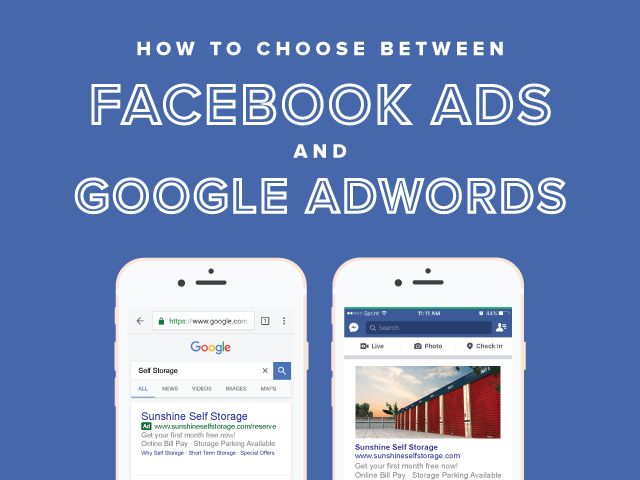Facebook Ads and Google Adwords account for 57% of all digital ad spend in the U.S. this year. And 74% of growth in all U.S. ad spend.
Facebook Ads and Google AdWords are both huge networks with massive reach. And they don’t require a particularly big investment by any business to prove if they produce results.
If your business advertises or plans to advertise on the internet, Facebook Ads and Google Adwords are going to be players in your media plan.
The best solution is to get experience with both. There are some areas where one does better or work differently than the other.
Here are 9 key differences to know between Facebook Ads and Google Adwords.
- REACH: Facebook has over 1.6 billion users, and Google has about 77% of global search volume. With over 180 billion Google searches per month, the potential reach of Google Adwords is far higher than that of Facebooks.
- TARGETING: Google doesn’t know people like Facebook does. Knowing what you Like, who you Like, who your friends and followers are and what you share has big advantages. On Facebook, you can choose the audience for your ads by using filters. They allow you to target your audience by demographic, interests, behavior and geography. Google Adwords, can trigger ads based search terms, affinities, topics of interest and geography. But Google can’t see what users “Like” or follow, nor can Google see data from their personal profile.
- AD CREATION: Facebook ads are created around what people like; Google Adwords around what they search: the Facebook ads creation process is different from AdWords. You target interests and behaviors with Facebook Ads. You target search phrases and needs on Google Adwords.
- COST PER CLICK (CPC): Facebook Ads on average cost less than Google Adwords. The average CPC on Google Adwords is between $0.35 to $5.00 with some industries like insurance as high as $54.17. With Facebook Ads, CPC’s are generally under $1.00 with retail industry averages at $0.45.
- CUSTOMER SUPPORT: Google Adwords is much more personal than Facebook Ads. Google Adwords has a support desk where a person can help you through the set up of your campaigns, explains resources, provide suggestions or act as sounding board. If your ads are having approval issues, their customer support people can tell you the reason. With Facebook Ads, although the dashboards are clear and easy to use, there is no personal support or interaction.
- BRANDING: Google Adwords has stronger branding opportunities. With AdWords, a click takes you to a company’s landing page, where branding, design and sales copy send a strong signal to the user. Google Adwords also has option to hype brand name in ads and use ad extensions to provide additional links to a website or callouts explaining other benefits to the brand that are not mentioned in the ads.
- SOCIAL PROOF: Facebook Ads own this area. On Facebook, you can see who Likes your ads, shares your ads and comments on your ads. Since 55% of consumers use Facebook to learn about brands the validation of others can be a very persuasive influence.
- ANALYTICS: Google Adwords is a more end-to-end solution. With Google Adwords, your ads can be linked through Google Analytics to determine the direct effect your advertising to desired action on your website and to understanding the consumer journey of your visitors to your website.
- ROI: As with any marketing strategy you’ll need to consider your return on investment. Google Adwords has a higher average conversion rate than Facebook ads. The average conversion rate on Google Adwords is 2.35%. On Facebook Ads, it is between 1-2%. Since conversion rate is one of the strongest precursors of ROI Google Adwords can be used to more precisely show ROI than Facebook ads.
Given the growth rate of Facebook Ads and Google Adwords, our advise for and digital advertiser is to get experience and understand the benefits of both for your business.
Do these key difference help explain Facebook Ads and Google Adwords to you? Does you need help determining how Facebook Ads and Google Adwords can produce results for your business?

